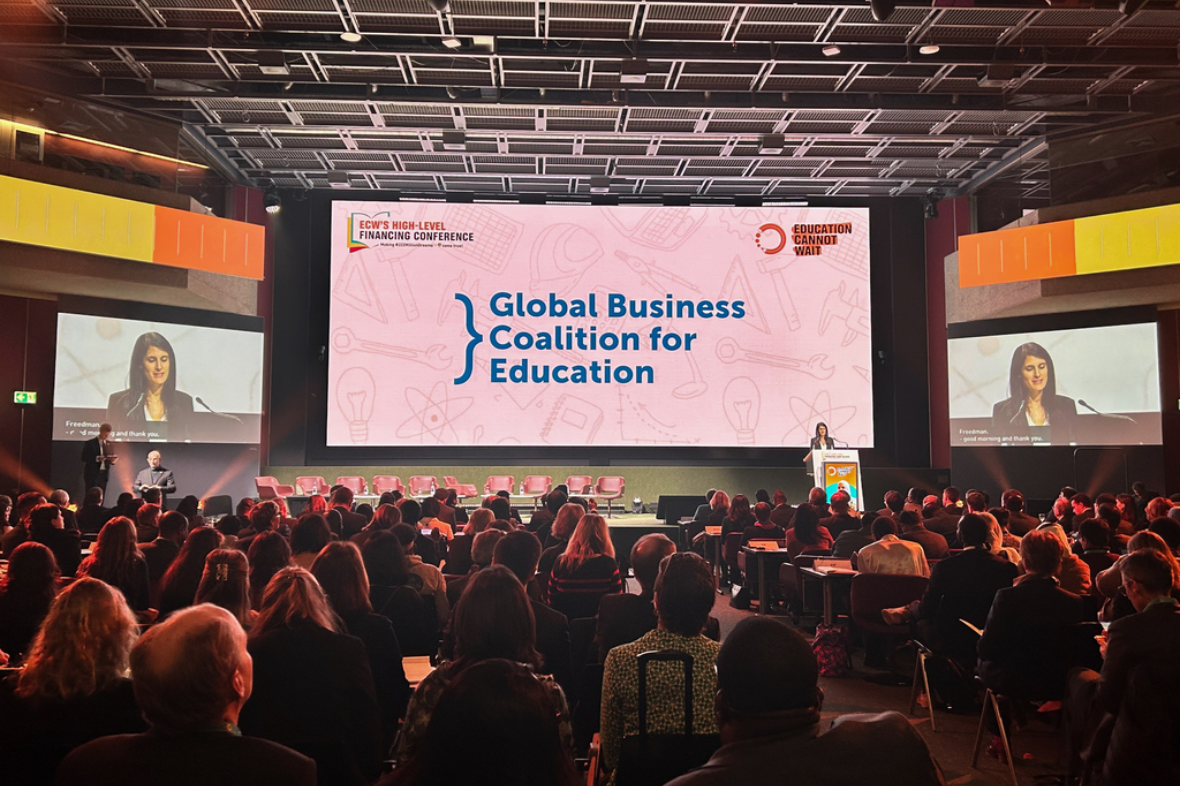
Innovative “ESG + Education Playbook” makes debut
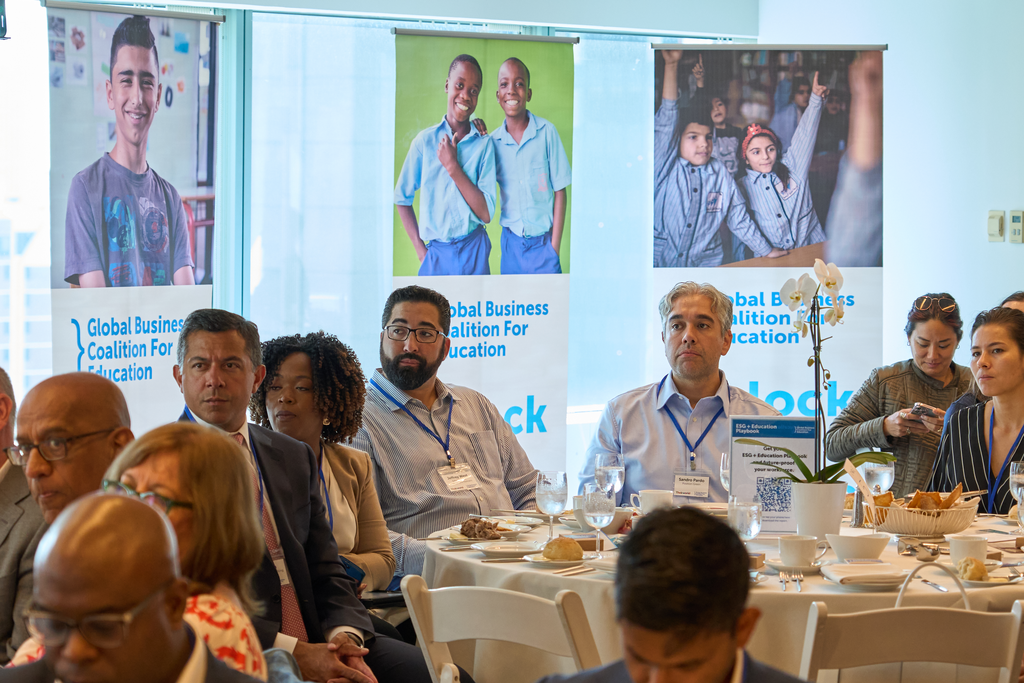
News, Press Release
Business executives from around the world gathered at our event to share ideas about using our new ESG Playbook.
Our innovative new playbook shows how companies can generate business value by investing in education. As the United Nations General Assembly met in New York recently, more than 100 executives and political leaders from around the world joined us to introduce the playbook.
The ESG + Education Playbook also demonstrates the why — why companies should prioritize education in their corporate strategies. The playbook draws on data-driven research. It’s the first of its kind: a clear, practical tool that ties corporate materiality to proven education solutions, based on reporting frameworks.
The playbook addresses the backlash in Environmental, Social, and Governance (ESG) strategies, showing how businesses, employees and shareholders benefit from these investments. And it goes even further — adding rigor and metrics to the “S” in ESG, to avoid “greenwashing.”
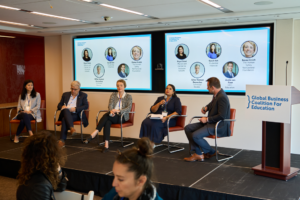
Panelists discussed our ESG playbook at a recent event. From left: Sarah Keh of Prudential Financial; Gilles Vermot Desroches of Schneider Electric; Emma Ursich of The Human Safety Net; Payal Dalal of Mastercard Center for Inclusive Growth; and Justin van Fleet of our organization.
“We know that a strong ESG strategy is linked to higher profitability and returns,” said David Boutcher, senior corporate partner at the global law firm Reed Smith and one of our board members at the Global Business Coalition for Education. Our organization, a movement of businesses committed to ending the global education crisis, crafted the playbook after reviewing two decades of in-depth ESG research.
The playbook’s chapters on supporting children in the early years should speak to many companies, said Emma Ursich, executive officer of The Human Safety Net, the corporate foundation of the insurance company Generali.
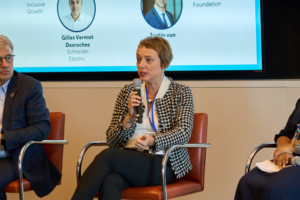 Emma Ursich of The Human Safety Net speaks about the value of companies investing in education.
Emma Ursich of The Human Safety Net speaks about the value of companies investing in education.
“The starting point in the challenge of rising inequality and education is to focus on the early years,” she said. “We see, and science tells us, that what happens in the early years influences what happens later in life — and that medium- to long-term view parallels the strategy and the business of our company.”
The ESG + Education Playbook shows that by investing in education, businesses can achieve long-term value creation, better financial outcomes and improved ESG performance. “We want to help companies use all the capital tools in their toolbox, from philanthropy to impact investing and sustainable finance to create meaningful ESG strategies and benefit society,” said Justin van Fleet, our executive director.
Payal Dalal, senior vice president of social impact, international markets, Mastercard Center for Inclusive Growth, said her company has been investing in education as part of its strategy on financial inclusion—helping those who are outside the banking system. One recent project: The company is helping garment workers, especially women, get paid electronically instead of in cash. Then it gives them guidance on saving money for the future.
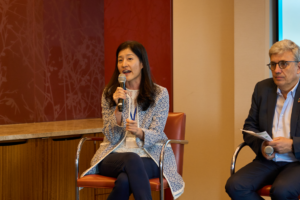
Companies explained their ESG strategies at our New York event. From left: Sarah Keh of Prudential Financial and Gilles Vermot Desroches of Schneider Electric.
“For our company to succeed, we have to help consumers feel confident not only in financial services but also in technology,” Dalal said. She added that the company, too, benefits by having more women around the world who understand financial services.
Gilles Vermot Desroches, chief corporate citizenship officer for Schneider Electric, said his company regularly checks progress on its ambitious education goals. For example: By 2025, it plans to train 1 million people — many of them in developing countries — in installing and maintaining sustainable energy. He said such skills training has the potential to help the company while helping the next generation prepare for high-demand and good-paying jobs. He noted that he had just returned from the Democratic Republic of the Congo, where about 50 million people are under age 20.
Sarah Keh, vice president, inclusive solutions, Prudential Financial, said the company is investing $180 million to train young people for jobs. In the U.S., she noted, more than 8 million jobs are open because companies can’t find the right employees. Prudential also is investing in upskilling and re-skilling its own workforce, she said.
Keh said that the company takes a practical view of these investments: “How do we leverage our assets, our products our services our philanthropy and impact investment to drive solutions for societal issues and also have a business return?”
To capture the scope of the challenges facing companies and individuals, we called the event “From Early Childhood to the Climate Crisis,” with a subtitle: “Leveraging Education to Create Shared Value.” Others sharing lessons from their ESG education successes included:
- Prat Panda, principal director, inclusive business lead, Accenture
- Michele Malejki, global head of social impact, HP
- Veronica Olazabal, chief impact and evaluation officer, BHP Foundation
- Sean Slade, head, BTS Spark North America
All said that ESG has been wrongly maligned by critics. They agreed that ESG — or whatever name it ultimately goes by — can be a plus for everyone, including consumers, clients, shareholders and employees.
And they noted that our event was especially timely. As the guests discussed the benefits of companies investing in education, the U.S. government was winding down $24 billion in pandemic aid to childcare providers across the country. According to a report from the Century Foundation, the combination of fewer options and increased costs of childcare could cost U.S. families about $9 billion a year in lost income.
The Global Business Coalition for Education is a movement of companies committed to ending the education crisis around the world.

Related Insights

Business investment in education can be a game-changer for young people
